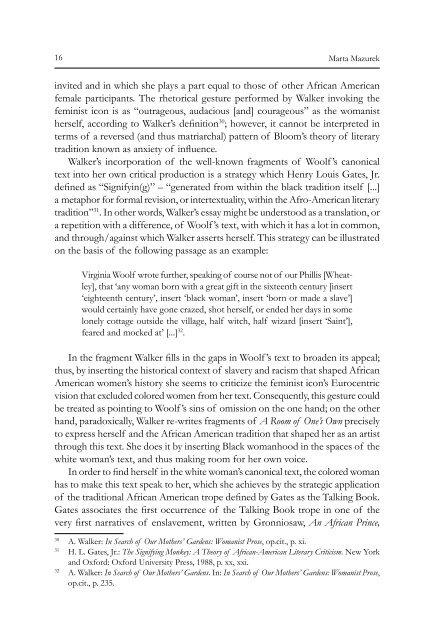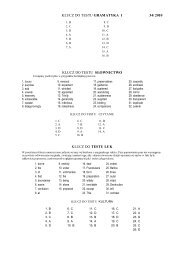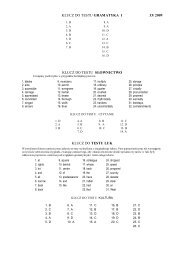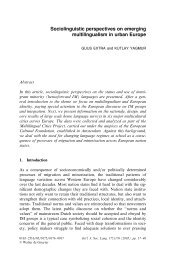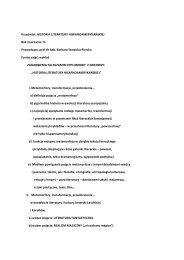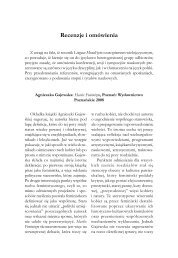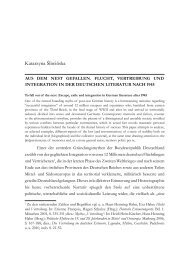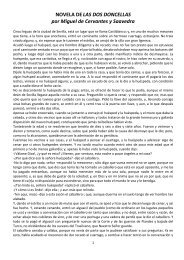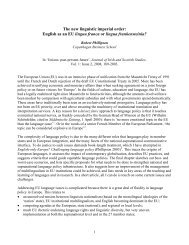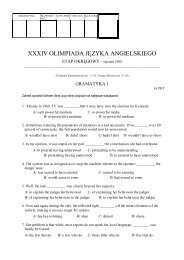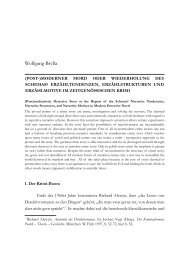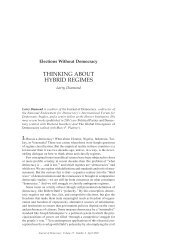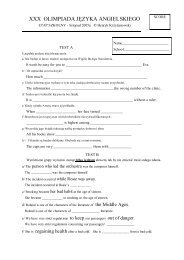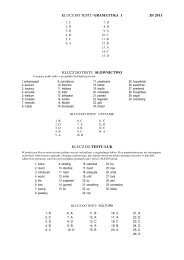African American women and feminism: Alice Walker's womanism ...
African American women and feminism: Alice Walker's womanism ...
African American women and feminism: Alice Walker's womanism ...
Create successful ePaper yourself
Turn your PDF publications into a flip-book with our unique Google optimized e-Paper software.
16 Marta Mazurek<br />
invited <strong>and</strong> in which she plays a part equal to those of other <strong>African</strong> <strong>American</strong><br />
female participants. The rhetorical gesture performed by Walker invoking the<br />
feminist icon is as “outrageous, audacious [<strong>and</strong>] courageous” as the womanist<br />
herself, according to Walker’s definition 30 ; however, it cannot be interpreted in<br />
terms of a reversed (<strong>and</strong> thus matriarchal) pattern of Bloom’s theory of literary<br />
tradition known as anxiety of influence.<br />
Walker’s incorporation of the well-known fragments of Woolf ’s canonical<br />
text into her own critical production is a strategy which Henry Louis Gates, Jr.<br />
defined as “Signifyin(g)” – “generated from within the black tradition itself [...]<br />
a metaphor for formal revision, or intertextuality, within the Afro-<strong>American</strong> literary<br />
tradition” 31 . In other words, Walker’s essay might be understood as a translation, or<br />
a repetition with a difference, of Woolf ’s text, with which it has a lot in common,<br />
<strong>and</strong> through/against which Walker asserts herself. This strategy can be illustrated<br />
on the basis of the following passage as an example:<br />
Virginia Woolf wrote further, speaking of course not of our Phillis [Wheatley],<br />
that ‘any woman born with a great gift in the sixteenth century [insert<br />
‘eighteenth century’, insert ‘black woman’, insert ‘born or made a slave’]<br />
would certainly have gone crazed, shot herself, or ended her days in some<br />
lonely cottage outside the village, half witch, half wizard [insert ‘Saint’],<br />
feared <strong>and</strong> mocked at’ [...] 32 .<br />
In the fragment Walker fills in the gaps in Woolf ’s text to broaden its appeal;<br />
thus, by inserting the historical context of slavery <strong>and</strong> racism that shaped <strong>African</strong><br />
<strong>American</strong> <strong>women</strong>’s history she seems to criticize the feminist icon’s Eurocentric<br />
vision that excluded colored <strong>women</strong> from her text. Consequently, this gesture could<br />
be treated as pointing to Woolf ’s sins of omission on the one h<strong>and</strong>; on the other<br />
h<strong>and</strong>, paradoxically, Walker re-writes fragments of A Room of One’s Own precisely<br />
to express herself <strong>and</strong> the <strong>African</strong> <strong>American</strong> tradition that shaped her as an artist<br />
through this text. She does it by inserting Black womanhood in the spaces of the<br />
white woman’s text, <strong>and</strong> thus making room for her own voice.<br />
In order to find herself in the white woman’s canonical text, the colored woman<br />
has to make this text speak to her, which she achieves by the strategic application<br />
of the traditional <strong>African</strong> <strong>American</strong> trope defined by Gates as the Talking Book.<br />
Gates associates the first occurrence of the Talking Book trope in one of the<br />
very first narratives of enslavement, written by Gronniosaw, An <strong>African</strong> Prince,<br />
30<br />
A. Walker: In Search of Our Mothers’ Gardens: Womanist Prose, op.cit., p. xi.<br />
31<br />
H. L. Gates, Jr.: The Signifying Monkey: A Theory of <strong>African</strong>-<strong>American</strong> Literary Criticism. New York<br />
<strong>and</strong> Oxford: Oxford University Press, 1988, p. xx, xxi.<br />
32<br />
A. Walker: In Search of Our Mothers’ Gardens. In: In Search of Our Mothers’ Gardens: Womanist Prose,<br />
op.cit., p. 235.


